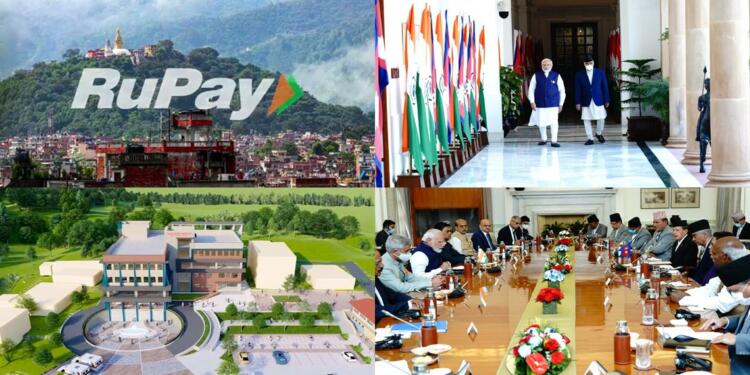Nepal’s Prime Minister Sher Bahadur Deuba has a simple message for China- get out of my country. And he has communicated this message with a symbolic move- launching the RuPay payment card in Nepal.
China is suddenly losing favour with Nepal. There was a time when a pro-China, Communist regime in Kathmandu was doing China’s bidding. But the Sher Bahadur Deuba government is clearly in sync with New Delhi and is telling China that it has no real diplomatic edge in the Himalayan country.
Nepalese Prime Minister Sher Bahadur Deuba arrived in New Delhi for a three-day visit on Friday. India and Nepal signed several MoUs, finalised a cross-border rail network, and agreed to work closely in the power and energy sectors. What however stood out was Kathmandu’s decision to launch India’s RuPay payment network system in the landlocked country of Nepal.
India and Nepal expand ties
India and Nepal inaugurated several joint projects during Deuba’s visit to India. Some strategic projects like a rail network between Jaynagar in Bihar and Kurtha in Nepal were also announced.
A power Solu Corridor 132 KV power transmission line and sub-station in Nepal that was constructed under a credit line extended by India to Nepal was also inaugurated.
PM Modi said, “Deuba and I agreed to give priority to trade and cross-border connectivity initiatives between two countries.” The Prime Minister also said, “We agreed on greater participation by Indian companies in Nepal’s hydropower development plans.”
Read more: Nepal’s Sher Bahadur Deuba government has dumped Chinese projects entirely
RuPay launched in Nepal
In fact, Nepal became a member country to launch India’s RuPay card after joining of many countries. Nepal has thus joined the league of Bhutan, Singapore, United Arab Emirates, Maldives, Saudi Arabia, Bahrain, Myanmar, South Korea etc.
This is a historic moment in Indo-Nepal relations as it shows growing confidence, trust and willingness for close engagement between the two nations. The Nepal SBI bank (NSBL), a subsidiary of the State Bank of India and the largest international bank in Nepal, is said to have worked on the initiative for more than one year in coordination with Nepal’s Central Bank.
Why is this a significant move?
You might think that RuPay payment card is just a payment network system. So, why is it a big deal? Well, it is going to enhance trade, tourism and business ties between the two countries.
PM Modi said, “Introduction of RuPay card in Nepal will add a new chapter to our financial connectivity.” The Ministry of External Affairs too said that the launch of RuPay card in Nepal will open up new vistas for cooperation in financial connectivity. The MEA expects that the move will enhance tourism between the two countries and also incentivise closer people-to-people ties.
For Nepal, RuPay payment card is a great product. Other payment networks charge a high transaction fee, whereas RuPay payment card offers minimal processing fee. Therefore, RuPay is a more affordable option for Nepal.
Read more: RuPay was really struggling and then came Narendra Modi
Moreover, it is a signal to China too. Nepal and India already enjoy people-to-people ties with an old culture of cross-border marriages and trade of merchandise taking place. Since there are cross-border family and business linkages, the launch of RuPay card in Nepal will only strengthen the already existing people-to-people ties between the people of the two countries.
As the Nepalese economy gets closely integrated with that of India, Deuba’s government is giving a loud and clear message to China- we don’t want to do business with you, so please get out of here.




















